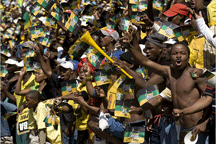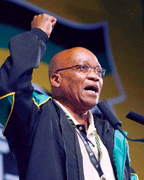
TAIPEI, Taiwan: – A South African student here says that “with the introduction of affirmative action and black empowerment” the country “has created a new style of apartheid”.
And while 18 million of the nation’s 23 million registered voters voted in general elections in April, Neville O’Reilley says that the country is not yet fully a democracy.
“South Africa has yet to experience a turnover in power so it cannot be classified as a full democracy. This might still be far off,” O’Reilley told I Witness-News.
The African National Congress (ANC) won the general election in South Africa in 1994, which marked the end of apartheid, and has won every general election since then.
The party, led by Jacob Zuma, 67, secured 65.9 percent of the vote at the last poll, according to Electoral Commission of South Africa .
It fell short of the two-thirds needed to ensure a parliamentary majority big enough to make constitutional changes unchallenged.

O’Reilley said that the “state and government are becoming closer intertwined, so it might be hard to distinguish between party and state”.
“[The] ANC is a semi-communist party and they have the support of the South African Communist Party. Now that the centre of the party has broken away from the ANC to form COPE (Congress of the People), just radicals are left in the far right and far left. This does not bode well for South Africa’s future,” O’Reilley said.
He said the results of the last poll was “somewhat predictable”, adding that the party still had core support from the lower income class of South Africa.
Unemployment in South Africa is officially over 20 percent and rising and over 40 percent of the population live below the poverty line.
O’Reilly said that South Africa’s main problems include “the corruption of the ANC” and the government, crime, unemployment and HIV.
“Firstly, we need to move towards a parliamentary system where not any popular person might become president rather [than] a party where experience counts and literacy.”
He said that Zuma was being plagued by corruption charges.

“Beleaguered Zuma is not fit for this post. He is a major problem for South Africa,” he said.
He said the country needed stricter laws to punish criminals and promote the use of condoms, even as he spoke of inequality in schools and work places.
Parliament elects the president in South Africa, and was expected to vote Zuma into office on May 6.
Zuma, who was jailed for ten years during the struggle against apartheid, was fired as deputy president in 2005 by former president Thabo Mbeki.
In 2006, Zuma was acquitted of raping an HIV-positive family friend. He has been ridiculed for his testimony during the trial that he believed showering after the encounter, which he said was consensual, would protect him from AIDS, the Washington Post reported.
He was also implicated in an arms deal bribery scandal and was dogged by corruption charges for the past eight years.
Prosecutors dropped all charges against Zuma earlier in April.
They said they had a strong case but the case had been manipulated for political reasons and the criminal charges would never be revived, the publication reported.
Zuma said in his victory speech that “there will be no surprises in the next administration’s program of action”.
“The electorate has endorsed our call for an equitable, sustainable and inclusive growth path that will bring decent work and sustainable livelihoods,” he said.





